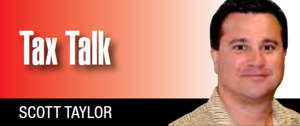Scam emails and phone calls are a constant occurrence these days. When a call comes in and you don’t recognize the number, or an email hits your inbox from an unknown source, responding to it feels more like a risk than an opportunity.
Unfortunately, the same scammers who are out there posing as wealthy Nigerians or lottery officials are also pretty convincing phony tax collectors.
Recently, we’ve had several clients tell us they were contacted by someone claiming to be from Canada Revenue Agency (CRA) who didn’t seem to be on the level. The “agent” accused the clients of being delinquent on their taxes and said immediate payment was needed in order to avoid jail time.
The caller was relentless with threats. Thank goodness, each of our clients knew they owed nothing to CRA and had the confidence to hang up the phone.
CRA is a perfect foil for scammers because people will do almost anything to keep the taxman off their back. Every year innocent people are lured into handing over their social insurance number, credit card numbers, bank account details, or other personal and financial information to thieves. They end up with a stolen identity, maxed-out credit card, and empty bank account.
If you receive suspicious email or call from CRA, here’s what you should know:
Emails
There are very few reasons for CRA to contact you by email. The CRA will never give or ask for your personal or financial information by email, or provide a link asking you to fill out an online form with personal or financial details. Nor will they send you an email with a link to your refund or demand immediate payment.
If you receive an email from CRA, it’s probably a phishing scam. At first glance, phishing emails look official but have links that direct you to a fake CRA website where you’re asked to verify your identity. There’s usually a sense of urgency, about how you need access your account and make a payment as soon as possible.
In fact, you’re feeding your credentials and money to the scammer.
Phone calls
There are times when it’s legit for CRA to call on the phone. For instance, they may need to verify your identity by asking for personal information such as your full name, date of birth, address, and account, or social insurance number.
They may call to let you know you’re being audited.
However, a CRA agent will never phone to ask for information about your passport, health card, or driver‘s licence, or to demand immediate payment by Interac e-transfer, bitcoin, prepaid credit cards or gift cards, or some other unconventional type of electronic funds transfer.
And never respond to agents who use aggressive language or threaten you with arrest or sending the police.
Text messages
CRA does not communicate with taxpayers by text messages or instant messaging such as Facebook Messenger or WhatsApp. Period.
CRA knows that fraud is an issue and has a section on its website with tips and ideas to help you recognize a scam and steer clear.
Finally, remember that communication goes both ways. If you receive a suspicious message, call CRA yourself at 800-959-8281 for personal services or 800-959-5525 for business services. Agents will be able to confirm whether any CRA department is looking to contact you.
Don’t keep this warning to yourself. Make sure your spouse, kids, parents, and friends all know. This is out there, it’s real, and can happen to anyone.
Scott Taylor is vice-president of TFS Group, providing accounting, bookkeeping, tax return preparation, and other business services for owner/operators.
Learn more at www.tfsgroup.com or call 800-461-5970.
